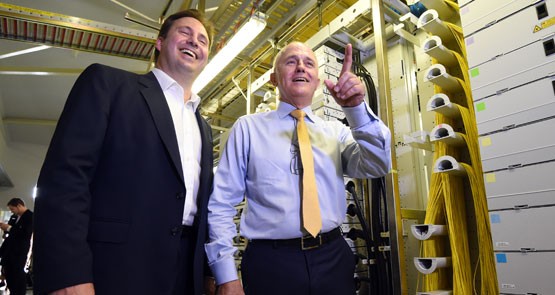
Yesterday’s trade figures dash hopes that the Prime Minister installed last September might have been able to fix Australia’s disastrous trade performance.
The Australian Bureau of Statistics reported that the trade deficit — the excess value of imports over exports — exceeded $2.8 billion for the fifth month in a row. That is the first time that has happened. Ever.
The monthly deficit for February was a thumping $3.41 billion. That has only been exceeded six times in Australia’s history. The first two times were in 2007-08, at the beginning of the global financial crisis. The other four all occurred during the current government’s term. The worst ever was $4.27 billion last April.
Should Malcolm Turnbull have tried to arrest this appalling performance by replacing then-trade minister Andrew Robb and Foreign Minister Julie Bishop when he dumped treasurer Joe Hockey and other duds in September? Probably. Whatever talent Robb might have had for negotiating treaties, he failed at the main game of maintaining exports.
Robb departed of his own volition in February. We shall soon see if replacement Steven Ciobo fares any better.
Figures released yesterday show:
- Exports for February were just $25.27 billion. That’s 8.5% below February last year and 13.6% below February 2014. It’s the lowest February figure in real terms since 2010;
- Total exports for the last six months fell below $157 billion. First time any six-month period has been that low in nearly three years;
- This is not attributable solely to iron ore prices. Yes, crude materials exports were down for February, and for the last 12 months. As were petroleum, mineral fuels and coal exports. Less predictably, other major sectors to have slumped in the last six months include food and live animals, meat, leather, cereals, medicinal and pharmaceutical products, scientific instruments, and tyres and other rubber products;
- Sectors marking time over the last six months are dairy, chemicals, machinery and transport equipment other than cars;
- Improved exports include fish, fruit and vegetables, tea and coffee, wool, manufactured goods and aeronautical components. These are minor contributors to the total, however; and
- Intriguingly, passenger motor cars recorded the strongest result for the 12 months to February of any year since 2009. Car exports at $2.07 billion were up 10% on the previous 12 months, and up 22.3% on the February 2013 figures — on which the decision was made to shut the sector. A hasty decision?
Why yesterday’s figures should sound alarm bells is not just because they are worse than earlier periods. But because most of the world is now enjoying steady growth in international trade, particularly the developed world. Of the 34 rich countries in the Organisation for Economic Cooperation and Development (OECD), 13 have maintained a reasonably steady trade balance over the last year, 16 have had it shift in their favour. Only five have experienced deterioration. Of those — Australia, Finland, Iceland, Mexico and Sweden — the most dismal performance is clearly Australia’s.
Of the 34 most prosperous nations, 12 recorded their highest ever trade surplus in the last 12 months. Only four countries recorded their lowest: Canada, Mexico, Sweden and Australia. Why the media refuses to report this is a story for another day.
Having a trade deficit is not necessarily undesirable or damaging. But it is certainly desirable to cycle in and out of surplus reasonably regularly. February’s result is Australia’s 23rd consecutive monthly deficit, with no sign of an upturn. By way of comparison, through the Rudd-Gillard years, the balance cycled into surplus four times, with the longest run of deficits 24 months.
Prior to that, the Howard period brought a record run of 78 consecutive monthly trade deficits — from April 2002 until a few months after the 2007 election, which it lost. In retrospect, surpluses should have been achieved through that period. But most of Howard’s deficits were relatively low compared with now.
What seems urgently needed is leadership in agility, flexibility and innovation. Yes, pretty sure we have heard that asserted recently. Unfortunately, Turnbull is not providing it.









“We was Robbed!”
Well, it is increasingly harder to buy anything made in Australia …… even our Olympic team uniforms. So, we export less and are forced to rely more on foreign made consumables. Hardly rocket science.
Well, if I used the arguments of AGW deniers I’d draw a line between the trade deficits of April 2015 and February 2016 and assert that the deficit will be around zero sometime around 2020, and that hence there’s no problem.
It’s OK to have a negative balance of payments if the negative is interest on borrowings to pay for added infrastructure (or other assets) that are going to eventually increase exports. To have a persistent trade deficit is a disaster, of the government’s making. And they’re going to add to it with planned but not budgeted defence spending.
I’d like to see a breakdown of the imports which would demonstrate just how much of an overconsuming society we’ve become.
As we make less than SFA anymore, by definition that means imports, most often made from the raw materials we exported which the ABS would call Elaborately Transformed materials.
Defence purchases? Airliner purchases? production equipment purchases? Interest on previous such purchases? Are some of our exports being sold cheaply to shell companies in Singapore for a song then sold on from there for the proper price? (Yes.)